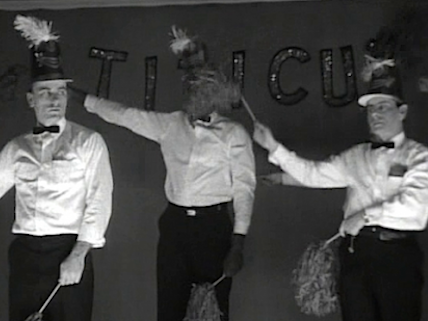Fifty Years After Titicut Follies, Frederick Wiseman Collects an Oscar
Wiseman made the only movie in U.S. history to be banned for reasons other than obscenity or national security.

The big news from the Oscars last night was the snafu at the evening's end, when the presenters accidentally announced the wrong winner for Best Picture. But the night before that, at the Saturday ceremony where they handed out honorary Oscars, another moment worth noting slipped by: An Oscar statuette went to the man who directed the only movie in U.S. history to be banned for reasons other than obscenity or national security. The filmmaker in question was Frederick Wiseman, and the film that was prohibited is Titicut Follies, a 1967 documentary about an asylum for the criminally insane. The state of Massachusetts suppressed the picture on the grounds that by exposing the inmates' miserable conditions, Wiseman was violating the prisoners' privacy.
Many of Wiseman's best-known pictures look at life in intensely bureaucratic or hierarchical institutions—besides Titicut Follies, there's High School, Hospital, Basic Training, Juvenile Court, and Welfare, among others—but he has also covered topics ranging from a small town in Maine to a department store. I interviewed him for Reason when Titicut turned 40, and we discussed both his free speech case and the career it kicked off. Here's an excerpt:
Reason: There's a recent trend toward documentaries in which the filmmaker makes himself a part of the action. Obviously that's very different from your style. Sicko and Hospital are both about American health care, but their approaches are just poles apart.
Wiseman: Well, I haven't seen Sicko, but generally speaking I'm not a fan of Michael Moore's.
Reason: How come?
Wiseman: I think he's an entertainer. I don't think he's interested in complexity.
I'm not against the filmmaker appearing in a film. I think some of the greatest documentaries I've ever seen have been made by a filmmaker who's present in the film. I don't know if you've seen any movies by Marcel Ophuls—The Sorrow and the Pity or Hotel Terminus. Ophuls is a great filmmaker because he's a great interviewer and he has a very sharp and analytical mind. In the case of Michael Moore, I don't see any particular filmmaking skills, and I think his point of view is extremely simplistic and self-serving.
One of my goals is always to deal with the ambiguity and complexity that I find in any subject. Even the simplest human act can be subject to multiple interpretations or have multiple causes. In Titicut Follies, for example, there are scenes where you see a guard or a doctor or a social worker being cruel to an inmate. But there are other situations where they're being kind. Some of them are both kind and cruel, if not simultaneously then serially.
Reason: You've said Titicut Follies is more didactic than your later films. Are there sequences you wish you had done differently?
Wiseman: Yeah. The best example is the forced feeding. I show too heavy an editorial hand in that sequence. Instead of intercutting it with the guy being made up for his funeral, it would have been better if I'd shown the forced feeding as a separate sequence, and then had some intervening sequences, and then shown him being made up for his burial later and cutting it in such a way that you recognize that it's the same person.
I think the way I did it forces the issue of whether the guy is treated better in death than in life. Whereas if I did it the way I just described, the viewer could have come to that conclusion instead of having it forced on him.
To read the whole interview, go here. To get ahold of Wiseman's films—including Titicut Follies, which eventually overcame the restrictions on it—go here. If you just want to see the wrong movie get called for Best Picture last night, go here. (But really, doesn't the wrong movie almost always win Best Picture? This time they were just a bit more upfront about it.)


Show Comments (8)